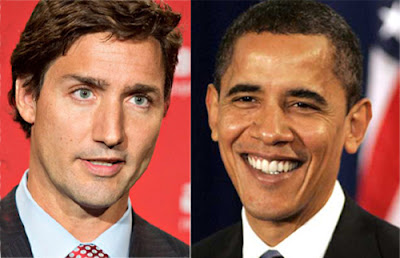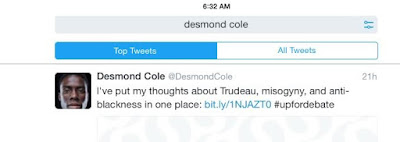Pick a debate, any debate, and Thomas Mulcair will find a way to bring up the "fact" that he reduced GHG emissions every year that he was the environment minister in Quebec, and that he was responsible for putting a clean environment as a right into Quebec's charter.
Of course, he will also say that he did not promote the sale of bulk water, despite video evidence. That video got the most re-tweets during last night's French language leaders debate.
However, that lie is pretty tame, compared to his other whoppers. Let's compare:
Did GHG Emissions really go Down Under His Stewardship?
In the 2012-13 Quebec government budget report, there is a section Quebec and Climate Change: A Greener Environment. As part of this they produce a graph.
Thomas Mulcair was Quebec Environment minister from 2003 to early 2006, but never drafted a Green Plan until 2004, and never actually acted on anything, favourable to the environment. So his policies (?) had no impact on reducing GHG, but in fact, one in particular, caused a spike.
This was the result of the TransCanada Energy’s combined cycle gas turbine in Becancour, a project he approved in 2004. The generating station was Quebec’s largest source of greenhouse gas emissions in 2007. (Wikipedia)
When Mulcair put his stamp of approval on the project, he had to break the rules established by his own government, since it would not meet the necessary requirements.
According to Mr. Paul-Yannick Laquerre, deputy chief of staff to Environment Minister Thomas Mulcair, the regulations would not apply to the project of Bécancour. Me Laquerre argued that the Régie de l'énergie approved the draft Bécancour on August 23, several months before the adoption of the Regulation ...
It was eventually scrapped and Hydro Quebec was forced to pay the company 250 million dollars just to get rid of it.
So in fact, Thomas Mulcair did not reduce GHG, but increased it.
The Promotion of Sustainable Development
When Yves Séguin resigned as minister of finance in 2005, Thomas Mulcair had hoped to take his place. However, Jean Charest chose someone else. Mulcair went into one of his famous sulks (see political cartoon above), but did a sulk cause Charest to expand Mulcair's ministry to include sustainable development and parks, which put him in charge of construction projects? Not a promotion, but certainly more power.
This meant that in spite of the announcement that he would finally present a long awaited "Green Plan", environmentalists were sceptical, and they were right to be, since they soon learned that it was not so much a plan for the environment, as a way of getting around environmental concerns, to aid the construction industry.
In 2012, the Research Quebec Group of Ecologists (RQGE), published a 250 page report for their thirtieth anniversary, in which they detailed their experiences with Thomas Mulcair, during some of their darkest days.
These are some of the things they revealed about his tenure in the Charest government.
1. In 2004, Mulcair announced massive cuts to environmental programs and to groups receiving funding for reseach and public awareness. (p. 220)
2. After meeting with minister Mulcair, whose attitude was less than cordial, environmentalist knew that they would have a different relationship with this government. One that would be more combative in nature. (p146) When the Ministry of Environment became the Ministry of Sustainable Development, and Parks; they noted that "sustainable development" was a new code phrase for skirting environmental protection. RQGE sent out a newsletter warning that with the drastic funding cuts and new policies that put industry first, their very existence was in jeopardy. (p152)
3. RQGE harshly criticized the "contempt Mulcair displayed" to environmental groups. "In a statement published in winter 2005, and with the support of Advisory Committee of independent community action which at that moment was " about 4000 action groups in the Community in Quebec, and called for "the immediate restoration of financing programs that would enable groups to fulfill their mission of defending the rights of the environment." (p159)
4. ... "environmentalists and community networks denounce the forced closure of several citizens groups fighting the environment, consequence of the abolition by the Minister Mulcair of all their funding programs". This was done so that he could replace their work with "partner companies" [public private partnerships] " They now knew why Mulcair appointed William Cosgrove, (p157) "Chairman of the World Council water and a champion of private and PPP and asked how Mulcair could "claim to focus his choices and actions towards a sustainable development when appointing a fervent defender of private interests at the head of a provincial organization." (p166)
5. They also speak of Mulcair's arrogance: "... he stubbornly refused to meet anyone" and , "The attitude of the Minister Mulcair is unacceptable, even contemptuous, against groups whose survival is threatened by abolishing funding programs " According to the Director of RQGE Ronald O'Narey, "The minister openly displays his prejudice favourable to the groups that are working directly and measurably in the field and appears biased against groups who issue opinions and comments on everything that contradict his". (p160)
6. They determined that Mulcair's Green Plan was "a facade that hid the true intentions of the government" where economic interests would outweigh environmental concerns. (p. 220)
7. When groups began to openly criticize Mulcair they were "... threatened with a SLAPP, and since many were now "completely penniless, since the cuts of Mulcair", they would not be able to defend themselves.
Mulcair did not disappoint the construction industry though:
Finally the new Ministry of Sustainable Development under Thomas Mulcair, is off to a terrible start. I received an email from the transportation department last week, Informing me that a projected bridge linking Laval and Montreal at 25 Highway, was part of the government's Plan for sustainable development. This bridge, will sacrifice 2,000 acres of farm land to urban sprawl in Laval, allow 150,000 more cars to enter Montreal each day and funnel off government funds that are desperately needed for public transport. Sustainable development is anything but objective... (Charest's sinking ship: After only two years in power, the Liberals are going down, Arthur Sandborn, The Montreal Gazette, April 13, 2005)
The bridge that Mulcair approved was dubbed "Mulcair's Bridge" and Highway 25, was a PPP project. This money was supposed to be earmarked for a commuter service.
Does this sound like a record to be proud of? We hear Mulcair mention "sustainable development" many times, but let's not be fooled. Just as "choice" means private, in conservative speak, this means locking arms with the construction industry, and destroying all environmental protections that get in their way.
Oh, and That Human Rights Thingy
Another claim made by Mulcair is that he entrenched the right to a clean environment into Quebec's charter of rights and freedoms, but it was a sham. It reads "Every person has a right to live in a healthful environment in which biodiversity is preserved, to the extent and according to the standards provided by law."
It doesn't say that laws must protect the right to live in a healthful environment, only that governments must enact their own environmental laws. They could have none at all and still respect the charter.
Is Mulcair a pathological liar? Perhaps. But fortunately, there is a cure for that. Let him retire on October 20. This country cannot afford another anti-environment prime minister.
























